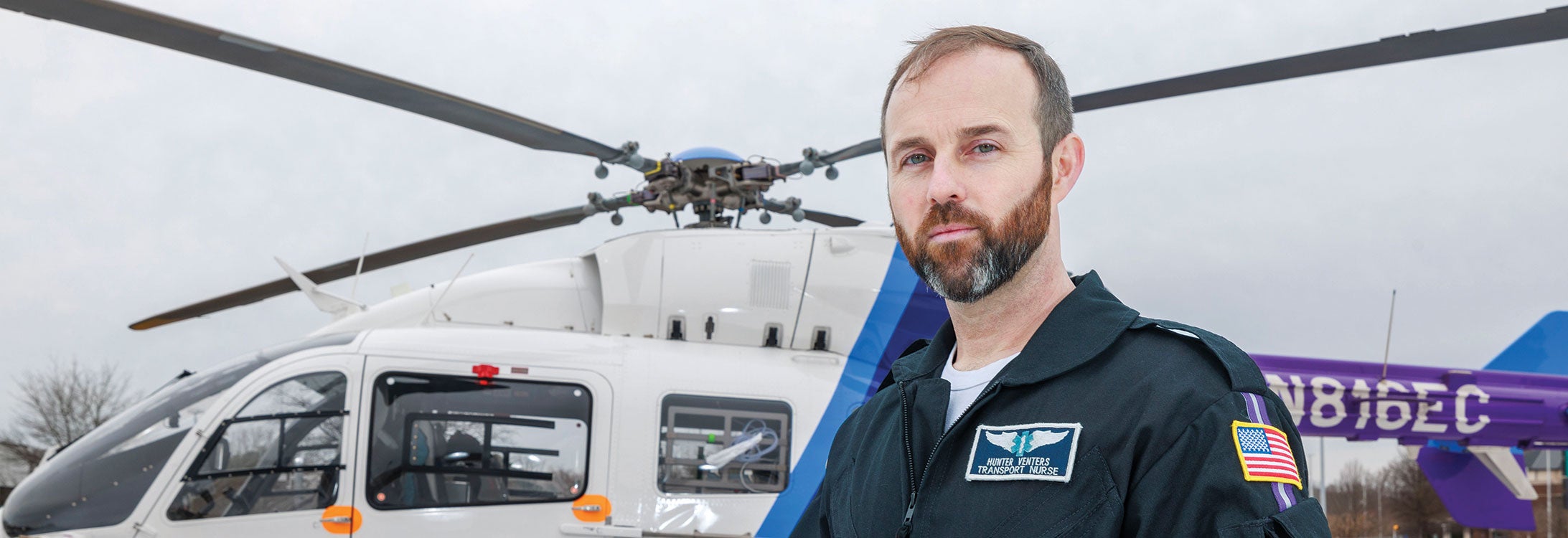Air Care
Growing up, Hunter Venters ’07 walked the fields of his family’s farms near Chicod in southern Pitt County, often seeing aircraft fly overhead.
Today, he can hardly remember a time when he didn’t fly over Pirate Nation – only in a critical care helicopter.
Venters is the clinical manager with EastCare, the air and ground critical care transport service of ECU Health. It serves an enormous swath of eastern North Carolina from Virginia to Wilmington and I-95 to the Outer Banks.
Venters knew he would go to ECU and become a nurse after graduating from D.H. Conley High School. His plan was to work as a nurse a few days a week and still help on the farm, but he soon realized a nurse’s life is too taxing to split his time between the hospital and the fields.
His first job after earning his nursing degree was at the cardiac ICU in New Bern. Then he got a job at ECU Health Medical Center caring for surgery and trauma patients.
“Every day I’d see my patients land on the rooftop and come to me. Then I thought, ‘Man, flight nursing looks cool,’” Venters said.
Becoming a member of an air ambulance team was no easy task. Venters applied with EastCare and submitted to a gamut of physical and psychological tests, clinical scenarios and intense interviews before landing the job in 2012.
Since 1985, EastCare has dispatched its helicopters to trauma scenes, such as car crashes, as well as transporting critically ill patients from regional hospitals to Greenville by helicopter and ground units, which were added in 1994. Before leaving the ground and in flight, Venters and his colleagues routinely performed procedures most of his peers weren’t qualified to do – needle decompressions, airway access and delivering medicines and fluids into the bone.
“You’re on a flying machine interacting with the pilot. You have seven different channels going on in your headset and talking to your partner about the patient,” Venters said. He’s completed more than 1,000 flights.
He and his wife, Ashley, met in nursing school. She works for ECU Health as a family nurse practitioner in Kinston, and they have two daughters and a son.
Trey Labrecque, director of EastCare, said Venters’ experience and education help develop the next generation of flight nurses for eastern North Carolina.
“Hunter’s ability to take an inexperienced nurse in critical care transport and mold them into an outstanding critical care flight nurse is tremendously valuable to our team and the patients we serve,” Labrecque said.
Venters credits his time at the College of Nursing with honing his critical-thinking and leadership skills.
“At ECU the education was more theoretical and leadership driven, and I didn’t really appreciate that until my second year of nursing school because then I was thinking at a different level,” he said. “ECU sets you up early for success, how to work through challenges.”
